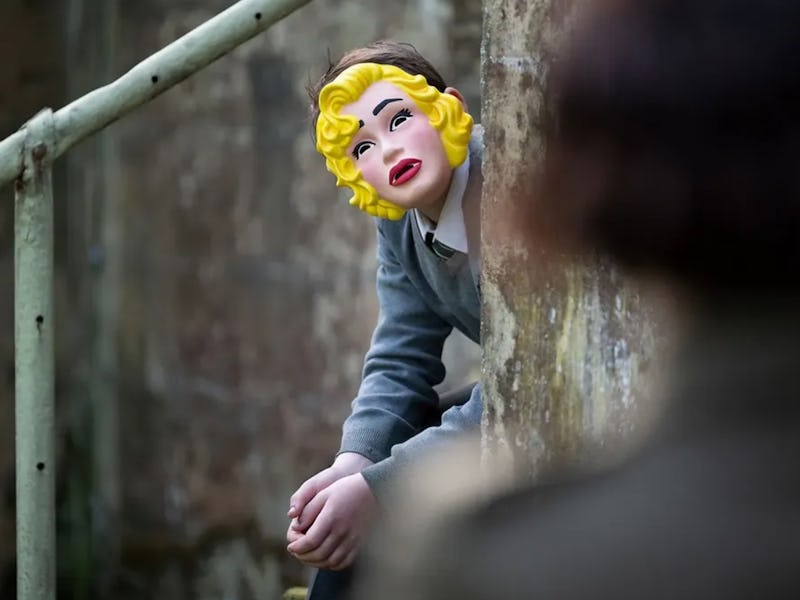With Civil War in Theaters, it’s Time to Revisit Alex Garland’s Most Disturbing and Divisive Movie
No matter where you hid, you couldn’t escape the discourse.

Alex Garland’s folk horror Men is full of deeply unsettling imagery. The masked man who runs toward leading lady Harper (Jessie Buckley) in a disused railway tunnel. The bloodied naked man who suddenly pops up in her rented vacation home’s front garden. The fact that every single male she meets in the country village, whether the vicar, a policeman, or even a young boy, looks identical to 40-something actor Rory Kinnear. Still, nothing can prepare you for what unfolds in its jaw-dropping climax.
The drama begins when Harper – who at this point is no doubt wishing she’d opted for a staycation – is once again targeted by the locals, first by a jerk who chases her back to her retreat, and then by the returning nudist who tries to break in. After defending herself, the fleeing Harper unintentionally runs over Geoffrey, the odd but seemingly kind-hearted proprietor. Yet even he proves to be a threat, dragging her out of her vehicle before using it to hunt her down.
Luckily, a stone wall thwarts Geoffrey’s rural take on The Hitcher. But Harper, already traumatized from witnessing her abusive husband James (Paapa Essiedu) plummet to his death, still isn’t over her terrifying ordeal. As she returns to the house of horrors she’s greeted by the naked man, now covered in foliage and transformed into the Green Man, a motif that symbolizes rebirth. Moments later, this monster is shown giving birth to the creepy young boy Harper had previously met in the church.
What follows is a Russian doll-esque body horror sequence where the boy births the vicar, who births Geoffrey, who births James. It’s an astonishing piece of cinema, evoking the grotesque amorphous orgy of 1989 yuppie satire Society, the startling closing scene of Takashi Miike’s Gozu in which a woman bears a fully-grown gangster, and much of David Cronenberg’s oeuvre. Yet its graphic amalgamation of congealed flesh, stretched limbs, and sticky fluids arguably out-disturbs the lot.
Unsurprisingly, this daring denouement provoked numerous walkouts, although for some it was the underlying themes more than the freakish visuals that put people off their popcorn. Some critics argued the scene was simply an excuse to demonize female reproduction, while others interpreted it as an acceptance of misogyny and toxic masculinity, its succession of increasingly pathetic individuals construed as a sign the birthing cycle instinctively breeds such traits, taking away men’s culpability in the process.
Harper witnesses cinema’s most grotesque birthing sequence.
Whatever the intention, Garland seemed happy to inspire so many think pieces, telling the Los Angeles Times, “Most people watch a film and they just kind of shrug and send an email or go get a beer or whatever. But if anyone is provoked by this film, hopefully they can query the provocation.”
It wasn’t just the gruesome special effects, inspired by classics such as The Thing and An American Werewolf in London, that some viewers took umbrage with. Once the gory process is complete, Harper comes face to face with the most significant man in her life, the one whose fall from their London apartment left her consumed with grief and guilt. Did her demands for divorce literally and figuratively push him over the edge? Or was his fatal impaling simply an accident? And what happens to his new form now?
Frustratingly, we never find out. Appearing to put all the carnage she’s just witnessed to one side, Harper joins James on the sofa and asks him what he wants. “I want your love,” comes the meek response, further antagonizing those who believe the film, not just its characters, is blaming its female protagonist for all of men’s ills. And then the story abruptly ends, a cue card bearing its capitalized title suggesting it really is all men.
The persistent naked man in his pre-foliage state.
A post-credits sequence in which concerned, heavily pregnant friend Riley (Gayle Rankin) shows up the morning after to find a smiling Harper does offer one definitive answer. It wasn’t all just a figment of the imagination. As evident from her shocked facial expressions, Riley sees the blood and the crashed car. The night before did really happen. But we’re left in the dark as to whether James is still around, or if Harper swung the axe she’d been holding throughout his rebirth.
Once again, Garland seemed content to provoke his audience. “I’ve heard interpretations of this film from different people who are perfectly intelligent and reasonable that are wildly different by 180 degrees. And that is not really a reflection on the film. It’s a reflection of them.” Although his latest movie, Civil War, has garnered a similarly divisive response, Men’s outrageous finale is likely to remain his ultimate bone of contention.